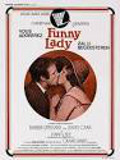
Directed by
Herbert Ross
137 minutes
Rated PG
Reviewed by
Bernard Hemingway

Funny Lady
Too long and suffering from the usual malaise of sequels, the you’ve-seen-it-all-before-and-it-was-better effect, Herbert Ross’s postscript to the smash hit 1968, Funny Girl, which was directed by William Wyler, also suffers from the problem that affected that film, the disparity between Striesand’s vocal and the overall production style and the era in which the film was set, even more so leaving us with an even-slimmer connection with the film’s subject, 1930/40s stage comediene, Fanny Brice.
If the first film's shortcoming in this respect were swept away by the vigour of Striesand's performance, here Babs, who has put on more than a few pounds since 1968, which her décolleté wardrobe regularly draws attention to, is a good deal less appealing (and by the film's end positively frightening). If Herbert Ross manages to give the production numbers and the film a bit of a kick in the first half, like its predecessor the film bogs down in the second half, particularly because of the dutiful introduction of Omar Sharif’s Nicky Arnstein, who now as polo-playing gigolo holds none of the charm of his appearance in the original, whilst the endless back-and-forth relationship between Brice and her new husband Billy Rose (James Caan) bears little fruit. Roddy McDowall as Brice’s faithful gay PA is just another element that is inserted into the film with no pay-off whatsoever.
For some reason Ross spent an awful lot of time and money showing us the staging fiasco that was the first Billy Rose – Fanny Brice musical but he would have been a lot better advised putting his energies into getting the elements of this film to cohere into a dramatically and musically engaging whole. As it is, it registers as only a commercially-motivated attempt to exploit the success of the first film.
Want something different?





